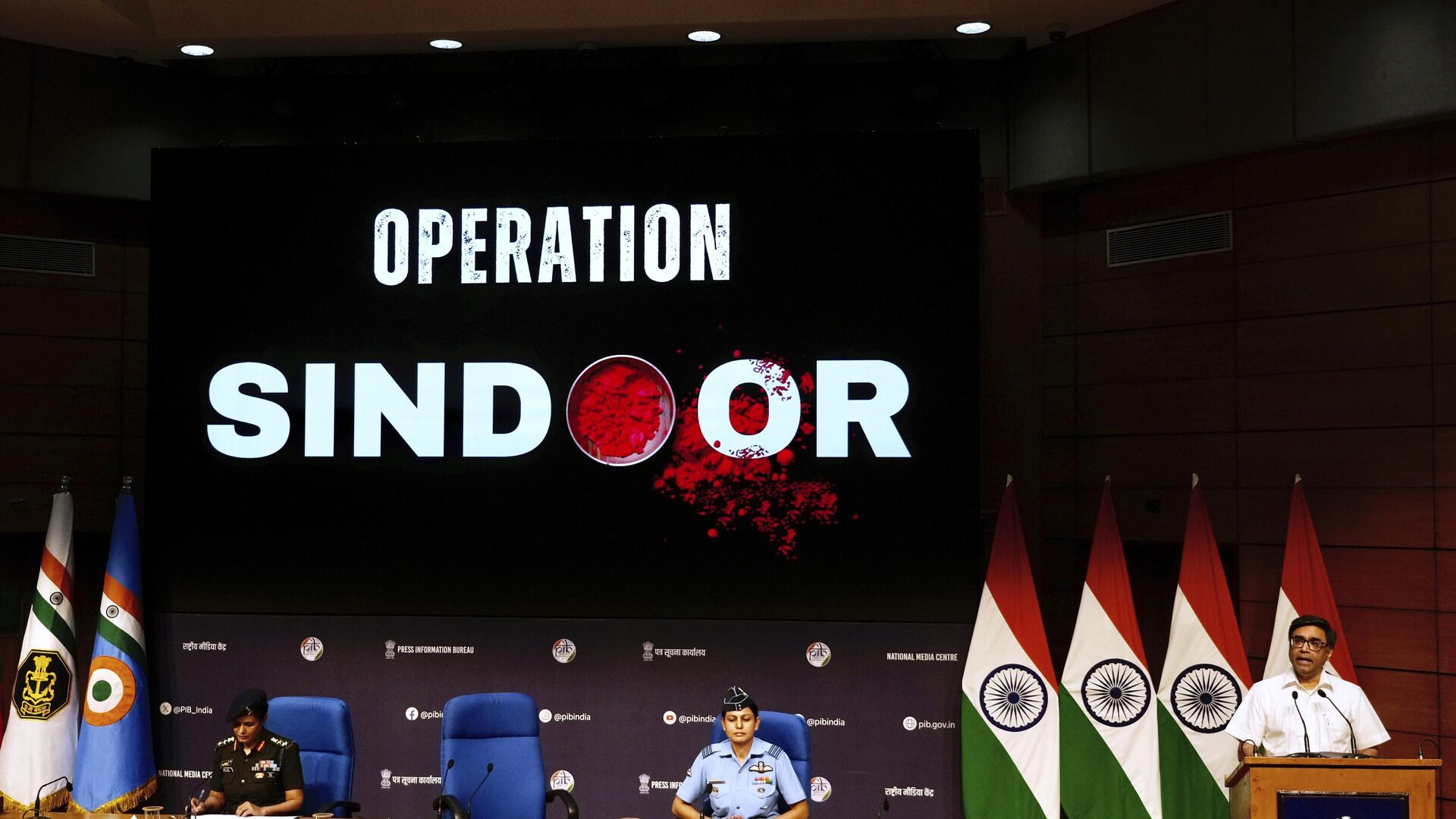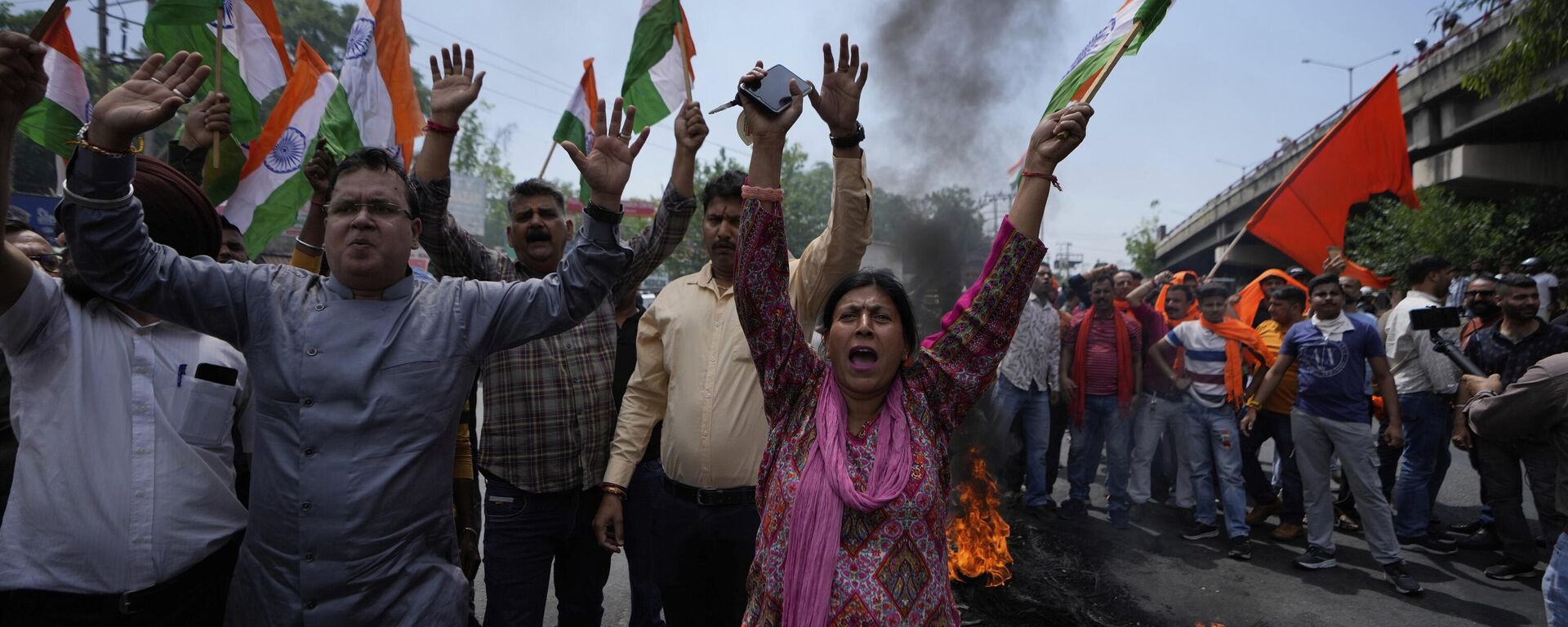https://sputniknews.in/20250516/who-won-heres-what-global-military-pundits-have-to-say-on-the-indo-pak-conflict-9139882.html
Who Won? Here's What Global Military Pundits Have to Say on the Indo-Pak Conflict
Who Won? Here's What Global Military Pundits Have to Say on the Indo-Pak Conflict
Sputnik India
With India successfully targeting Pakistan's military bases and radar sites, and also an alleged nuclear weapons storage facility, the escalating conflict came... 16.05.2025, Sputnik India
2025-05-16T08:32+0530
2025-05-16T08:32+0530
2025-05-16T08:32+0530
sputnik opinion
india
pakistan
russia
indian air force (iaf)
pentagon
sukhoi su-30mki
s-400 air defense systems
islamabad
delhi
https://cdn1.img.sputniknews.in/img/07e9/05/07/9076259_0:166:3072:1894_1920x0_80_0_0_251ae33a84829ce0440f7f7322d8475b.jpg
Global military experts have been unanimous in their analysis of last week's kinetic duel between India and Pakistan, underlining that India clearly dominated with overwhelming superiority.Among the first ones to heap praise on India's Defence Forces for their quick decisions was John Spencer, an award-winning American defence analyst and one of the most recognised pundits on urban warfare, military strategy, and tactics.A former Pentagon official and US Army veteran, Spencer confirmed that India achieved a "massive victory" over Pakistan in what was largely an aerial contest between the armed forces of the two nuclear-armed nations.India's restraint is not weakness—it is maturity. It imposed costs, redefined thresholds, and retained escalation dominance. India didn't just respond to an attack. It changed the strategic equation, he added. Additionally, Tom Cooper, an Austrian defence specialist and one of the most credible aviation analysts, called it a "clear-cut victory" for India.Cooper also believes that India struck one of the sites (Kirana Hills) storing Pakistan's nuclear weapons, a claim officially denied by the Indian military. However, the international aviation commentator underscored that there were videos available that suggest otherwise. The moment the Indian Air Force started striking nuclear weapon storage facilities in Pakistan, it was absolutely clear that Pakistan is, not entirely defenceless, but largely unable to defend itself from Indian strikes, he noted.Meanwhile, Igor Korotchenko, a Russian military analyst and the Director of the Centre for Analysis of World Arms Trade (CAWAT) in Moscow, credited the S-400 for allowing the Indians to dominate the skies against Pakistan.The S-400, enhanced with elements of artificial intelligence, allowed the Indian military to swiftly assess the nature of Pakistani strikes and apply the most effective countermeasures, the observer reckoned.Mikael Valtersson, a former officer of the Swedish Armed Forces, specialising in air defence, saw no difference between the Western, Russian, or Chinese weapons involved in the conflict between the Islamic state and India. First of all, there was no qualitative difference between the Western, Russian, or Chinese weapons involved, to the chagrin of Western observers. Secondly, India saw the strikes against terrorist bases as an anti-terrorist operation and acted accordingly, he told Sputnik India.Furthermore, he described India's security allies in the Indo-Pacific as "unreliable".While QUAD members, especially the US, want Indian cooperation against China, but are of no help when it comes to India's prime adversary, Pakistan, he expressed.Indian security expert Namit Verma declared in a conversation with Sputnik India that the Indian Tri-Services Operation Sindoor was a great success, which took apart the Pakistani retaliatory Operation Bunyan-un-Marsoos. However, Operation Sindoor was not without its moments of high drama, unforeseen hurdles, and complications that threatened to reverse the initial gains and trap India in a terrible quagmire, he assessed.
https://sputniknews.in/20250515/india-presents-evidence-to-un-seeks-terrorist-tag-for-the-resistance-front-9134099.html
india
pakistan
russia
islamabad
delhi
new delhi
Sputnik India
feedback.hindi@sputniknews.com
+74956456601
MIA „Rossiya Segodnya“
2025
Pawan Atri
https://cdn1.img.sputniknews.in/img/07e6/0c/13/139630_147:0:831:684_100x100_80_0_0_8fa2b25903e7787fe6a2698552c167df.png
Pawan Atri
https://cdn1.img.sputniknews.in/img/07e6/0c/13/139630_147:0:831:684_100x100_80_0_0_8fa2b25903e7787fe6a2698552c167df.png
News
en_IN
Sputnik India
feedback.hindi@sputniknews.com
+74956456601
MIA „Rossiya Segodnya“
Sputnik India
feedback.hindi@sputniknews.com
+74956456601
MIA „Rossiya Segodnya“
Pawan Atri
https://cdn1.img.sputniknews.in/img/07e6/0c/13/139630_147:0:831:684_100x100_80_0_0_8fa2b25903e7787fe6a2698552c167df.png
india, pakistan, russia, indian air force (iaf), pentagon, sukhoi su-30mki, s-400 air defense systems, islamabad, delhi, new delhi, pakistan army, indian army, operation sindoor, pahalgam terror attack , counter-terrorism
india, pakistan, russia, indian air force (iaf), pentagon, sukhoi su-30mki, s-400 air defense systems, islamabad, delhi, new delhi, pakistan army, indian army, operation sindoor, pahalgam terror attack , counter-terrorism
Who Won? Here's What Global Military Pundits Have to Say on the Indo-Pak Conflict
With India successfully targeting Pakistan's military bases and radar sites, and also an alleged nuclear weapons storage facility, the escalating conflict came to a grinding halt on Saturday, May 10.
Global military experts have been unanimous in their analysis of last week's kinetic duel between
India and
Pakistan, underlining that India clearly dominated with overwhelming superiority.
Among the first ones to heap praise on India's Defence Forces for their quick decisions was
John Spencer, an award-winning American defence analyst and one of the most recognised pundits on urban warfare, military strategy, and tactics.
A former Pentagon official and US Army veteran, Spencer confirmed that India achieved a "massive victory" over Pakistan in what was largely an aerial
contest between the armed forces of the two nuclear-armed nations.
"After just four days of calibrated military action, it is objectively conclusive: India achieved a massive victory. Operation Sindoor met and exceeded its strategic aims—destroying terrorist infrastructure, demonstrating military superiority, restoring deterrence, and unveiling a new national security doctrine. This was not symbolic force. It was decisive power, clearly applied," Spencer wrote on X.
India's restraint is not weakness—it is maturity. It imposed costs, redefined thresholds, and retained escalation dominance. India didn't just respond to an attack. It changed the strategic equation, he added.
Additionally, Tom Cooper, an Austrian defence specialist and one of the most credible aviation analysts, called it a "clear-cut victory" for India.
"No surprise Islamabad 'sounded' for a cease-fire," he posted on social media. "With at least two of PAF's HQ-9s knocked out two days earlier, and the PAF suppressed enough to stop shooting PL-15s into the Indian airspace, in a matter of three hours the IAF Su-30MKI-, Mirage 2000- and Rafale-crews found enough opportunities to deliver a few really heavy blows. After this series of blows, the writing was on the wall: pending the IAF exhausting its stocks of Brahmos and SCALP-EGs, Pakistan had nothing left to counter these."
Cooper also believes that India struck one of the sites (Kirana Hills) storing Pakistan's nuclear weapons, a claim officially denied by the Indian military. However, the international aviation commentator underscored that there were videos
available that suggest otherwise.
The moment the Indian Air Force started striking nuclear weapon storage facilities in Pakistan, it was absolutely clear that Pakistan is, not entirely defenceless, but largely unable to defend itself from Indian strikes, he noted.
"The government in India, New Delhi, and top brass of the armed forces are cautious enough not to brag too much about this, even to deny it, but we have seen videos showing strikes on one of the… no actually, two defence nuclear weapons storage facilities in Pakistan. This is speaking such a clear language, I cannot emphasise this enough, do not play with nuclear facilities, nobody is doing that, and especially not, rather conservative and cautious Indian generals, they are not going to shoot all over the place," Cooper stressed.
Meanwhile,
Igor Korotchenko, a Russian military analyst and the
Director of the Centre for Analysis of World Arms Trade (CAWAT) in Moscow, credited the S-400 for allowing the Indians to dominate the skies against Pakistan.
The S-400, enhanced with elements of artificial intelligence, allowed the Indian military to swiftly assess the nature of Pakistani strikes and apply the
most effective countermeasures, the observer reckoned.
"Pakistan recognised the capabilities of the S-400, which is why disinformation campaigns against it were initiated. The system performed exceptionally in countering the targets raised by Pakistan. India gained a significant advantage in this regard," Korotchenko told Sputnik India.
Mikael Valtersson, a former officer of the Swedish Armed Forces, specialising in air defence, saw no difference between the Western, Russian, or Chinese weapons involved in the conflict between the Islamic state and India.
First of all, there was no qualitative difference between the Western, Russian, or Chinese weapons involved, to the
chagrin of Western observers. Secondly, India saw the strikes against terrorist bases as an anti-terrorist operation and acted accordingly, he told
Sputnik India. "The superior Indian air defence limited damages on the Indian side from Pakistani missiles and drones, while the latter suffered extensive damage to its air bases," he said.
Furthermore, he described India's security allies in the Indo-Pacific as "unreliable".
While QUAD members, especially the US, want Indian cooperation against China, but are of no help when it comes to India's prime adversary, Pakistan, he expressed.
"Russia showed much more support than the QUAD. Something that will increase Indian willingness to buy 5th generation fighters (Su-57), long-range Air-to-Air Missiles (AAMs), and advanced Surface-to-Air Missiles (SAMs) from Russia in the near future," Valtersson emphasised.
Indian security expert Namit Verma declared in a conversation with
Sputnik India that the Indian Tri-Services Operation Sindoor was a great success, which took apart the Pakistani retaliatory Operation Bunyan-un-Marsoos.
However, Operation Sindoor was not without its moments of high drama, unforeseen hurdles, and complications that threatened to
reverse the initial gains and trap India in a terrible quagmire, he assessed.
"Also, as they say in the Armed Forces, fortune favours the brave; that certainly happened on May 9 - 10, we eventually succeeded even beyond our wildest imaginations as we managed to hit the enemy’s secret cache of Nuclear Arms, forcing Pakistan to seek a ceasefire at the earliest," Verma summed up.



